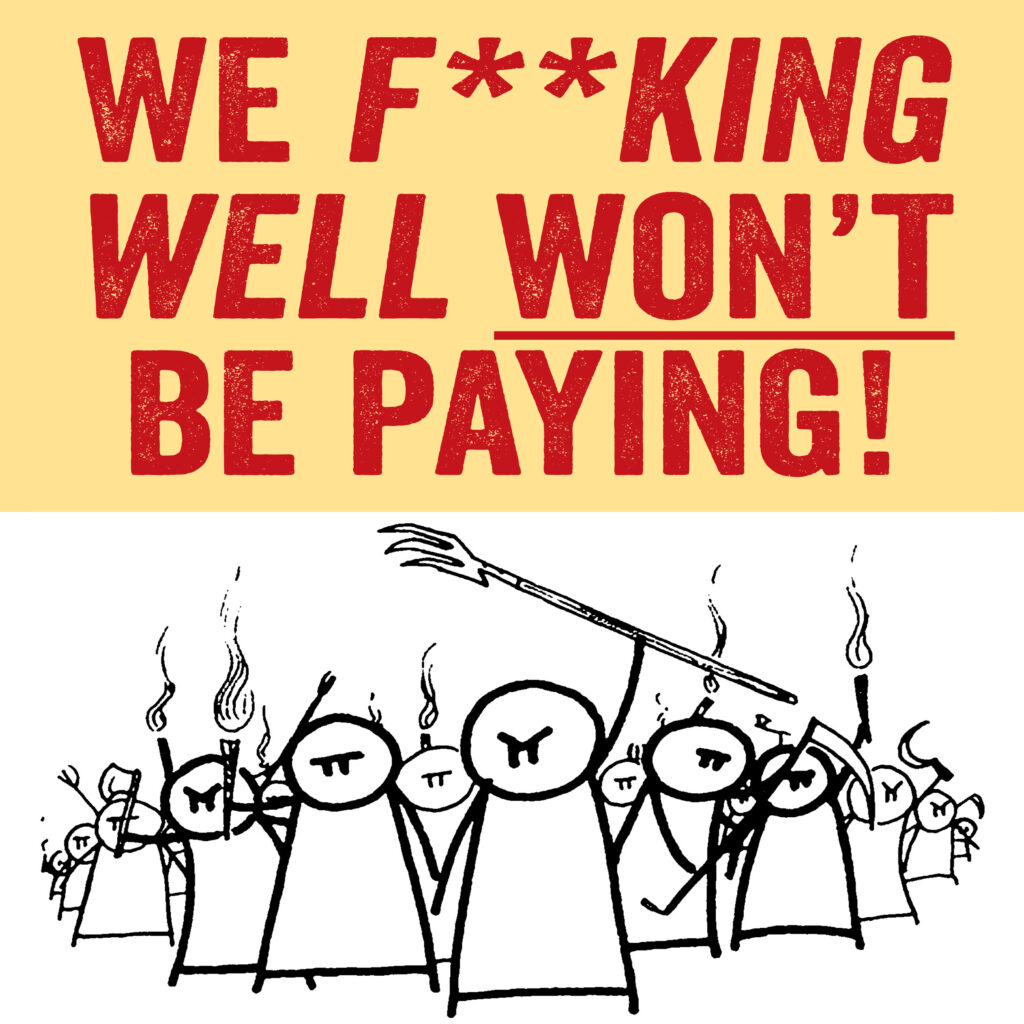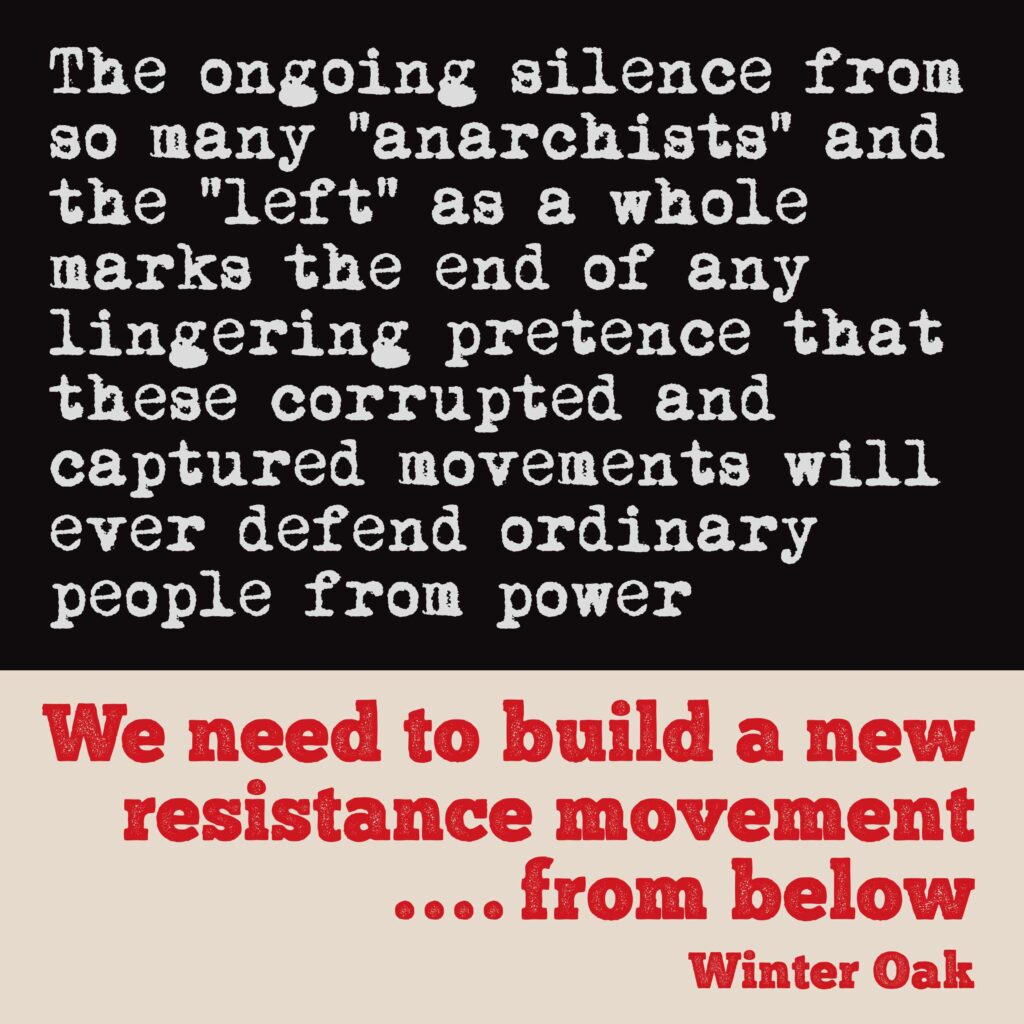
This piece was originally published on The Stirrer blog
Martin Lux a.k.a. The Whitechapel Anarchist voices his opinion on the (possible) demise of identity politics in this podcast: THE DEMISE OF IDENTITY POLITICS? 4.6.22. The aim of this piece is to discuss whether Martin’s analysis has legs and that eventually, we will see the end of the forms of identity politics that have proved to be divisive and ultimately, counter-productive.
We at The Stirrer have gained a bit of a reputation as harsh critics of identity politics. That’s a reputation that dates back to our days in the Independent Working Class Association. Our stance on how divisive identity politics is in the wrong hands has, over the years, cost us comrades. That’s why, at the time of writing, we find ourselves out on the margins of the anarchist movement. So be it, we’d rather be true to our principles that be everyone’s ‘friend’, living a lie in the process. However, despite what some of our critics may think, we reckon our stance on the issue is actually pretty nuanced: The debate that won’t go away – Working Class Anarchism versus Middle Class ‘Identity Politics’ 20.2.22.
The best place to start with this debate is to look at where we currently are. We’re in a situation that can best be described as a clusterf**k. Below are just some of the manifestations of this…
Energy bills are rising – any interventions that the government may make over this are at best, window dressing. The cost of food is going up with no sign of the rises easing off. With both energy and fuel increasing in price, a growing number of people are being forced into a situation where they have to mark a stark choice between heating and eating. People are becoming desperate. When people become desperate, they do things that in normal circumstances, they wouldn’t even dream of. One of those is shoplifting. It’s a sign of the times when supermarkets are putting security tags on staple food items such as cheese.
On top of this, the services and utilities we rely upon are failing and crumbling. Bus services are being axed, making it harder for non drivers to get around: Disappearing… 28.8.22. The rail network is suffering from a lack of serious investment, with track failures, broken down trains and the subsequent delays becoming more common. The privatised sewerage utilities are dumping an ever increasing amount of untreated sewage into our rivers and onto our shores. The NHS is creaking at the seams, albeit some of that is self inflicted as a result of how they chose to respond to Covid and what to all intents and purposes feels like the rationing of care. As a result of how the education sector responded to Covid with remote learning and a subsequent loss of face to face contact, there’s a generation of kids coming through where a significant minority feel they’ve been rejected by the system. That’s going to have a negative impact on social cohesion for decades to come.

There’s a wave of industrial action that isn’t going away any time soon. This ranges from rail workers and postal workers through wildcat strikes at a number of Amazon depots all the way over to journalists and barristers taking strike action. The strikes are in response to pay not keeping up with inflation plus management cultures where workers are put under increasing pressure and treated with a lack of respect. Away from the workplace, Don’t Pay UK appear to be the ones currently leading the fight against the energy bill hikes. All of the above and more look to be leading to this: A winter of discontent? 29.8.22.
Pretty much all of the above is moving the issue of class back towards the centre stage. This is because what we’re experiencing is pretty much undisguised class war directed against the working class. Simply by having the relationship we have with the means of production and the state, we’re in the firing line from corporate interests who want to hoover up an ever increasing amount of wealth into their coffers. Being working class is not an identity you can pick off the shelf – it’s an expression of the relationship we have with capital and the state. It doesn’t matter how we identify within the working class – at the end of the day, we’re all getting screwed. Having said that, our lords and masters are pretty interested in how we do identify because in the range of quite possibly competing identities and their attendant claims, they can sow the seeds of division within our class with their tactics of divide and rule. The problem is that too many of the people we once thought were on our side bought into identity politics without thinking through how it can be manipulated to implement an agenda of divide and rule.
So, is identity politics on its way out? Is working class unity on its way back in? We’d love to think so but…and there’s always lots of buts! You’ve only got to look at how many companies and institutions have brought into and incorporated many aspects of identity politics. That’s not because they’ve any interest in genuine equality because they most definitely haven’t. They’ve incorporated identity politics because it’s a way of policing workers and society at large by attempting to make people hyper-vigilant about how they relate to and address each other. Obviously, we’re all for people treating each other with respect. That means acknowledging differences but crucially, it also means bearing in mind what unites us all in spite of those differences. Identity politics has been twisted and co-opted to ensure that any recognition of what we all have in common is right at the bottom of the agenda.

Identity politics, in its twisted and co-opted form, has been too deeply entrenched in many companies and institutions to ever go away without a fight. Given that we have a growing number of problems with real, material roots to contend with, do we want to have to be dislodging identity politics on top of that? The honest answer to that is no but the truth is, we have to. The proviso being that we do so in a way that advances class struggle. What compounds the problem is the way that what feels like too many activists have unthinkingly adopted an agenda of identity politics which is increasingly at odds with the liberation struggles that preceded it. Struggles that wanted equality for all, regardless.
Over the years, we’ve written and said a lot about how a pernicious form of identity politics has taken over not just the left, but a fair chunk of the anarchist movement as well. As mentioned earlier, this is one of the factors that has pushed us and many others to, and beyond, the margins of a movement we once felt we have some connection with. We – and we suspect many others – have reached the conclusion there’s no point in expending any more time or energy arguing with that section of the movement and the activists associated with them who have embraced identity politics without making the effort to properly interrogate it. That’s not just because life is too short and we can’t be arsed to spend any more time in pointless rows, being cold shouldered or getting abuse because we’ve failed ever demanding purity tests. It’s because events are moving at such a speed that we have to make sure we can relate to ordinary people and not alienate them with what they’ll see as irrelevant purity tests.
Long ago in a different political existence, I was told that should a revolutionary situation arise, it will be highly unlikely that many people involved will have what activists would regard as a ‘perfectly formed’ political outlook. I was also told that some of those involved may hold views which could be considered reactionary. During my time of pounding the streets and knocking on doors for the Independent Working Class Association, one thing I very swiftly learned was that most people are apolitical and can’t be pinned down on the political spectrum because they hold a range of views that quite often, span that spectrum. I also learned that before arguing with people, it’s worth taking time out to listen to them, and understand where they’re coming from. Doing that gained me the respect I needed to then engage people in a debate. In a nutshell, we have to work from where people are and also, make the effort to understand why they are where they are.

As mentioned earlier, a growing number of people are getting very angry about what’s being done to them. This ranges from the various currents of opinion who came together on the streets every month or so to oppose the Covid lockdown restrictions and the proposed vaccine mandates through to the growing campaign against the hikes in energy prices. What’s interesting about the Don’t Pay UK is that they’re gaining support from some of the currents of opinion who were out on the streets opposing the lockdowns. The swirl of anger and the opinion that informs it is more complex, fluid and indeed contrary than anything I’ve ever known. We do indeed, live in interesting times…
In such a climate, some people retreat to certainties and that has happened with a fair number of radicals and anarchists. Rather than trying to analyse a complex and admittedly contradictory situation, instead it feels as though they’re retreating further into self referential and self reinforcing bubbles. My attitude and that of a growing number of activists who get what’s going on is simply one of let’s leave them to it. Things are getting too serious to get bogged down in pointless, energy and morale sapping rows. Those activists clinging to a pernicious, twisted interpretation of identity politics can and should simply be bypassed.
Over the last few years, we’ve seen protest movements emerge that are not comprised of what some would term as ‘the usual suspects’. For sure, there have been reactionary elements sniffing round the fringes of these movements attempting to exploit them for their own nefarious purposes. The reason they do this is because they can see the political vacuums left by so called radicals whose purity tests are restricting them to ever tighter, self referential circles. Given the clusterf**k we’re in, we have to deal with the situation as we find it. That situation will be complex, messy, fluid and contradictory. It’s called reality. Retreating ever further into an identity politics obsessed bubble in these times can only be described as an act of betrayal. We and a growing number of people we know have no intention of associating with people like this and every intention of reaching out and grasping the opportunities for radical change that are increasingly manifesting themselves.
To very briefly conclude, identity politics may not be on its way out as it’s too deeply entrenched. There’s nothing more to be gained by attempting to engage with identity politics zealots. Quite simply, they have to be bypassed. There’s everything to be gained by engaging with the growing waves of discontent and anger coming from people who have never been involved in any form of activity before. From this point, it can be onwards and upwards…

Hi Stirrer
There’s definitely a lot more to say on this e.g. the misogynistic TRA cult and their pathetic pile-ons , posh kids on their way to NGO.’s looking for street cred with the ageism and ‘sexy’ lifestyle anarchism (so disliked by Bookchin). We could mention Freedom, The Bookfair….